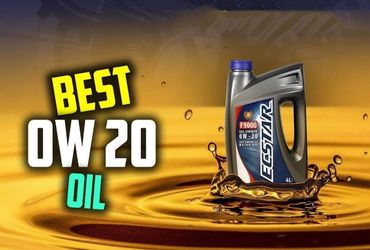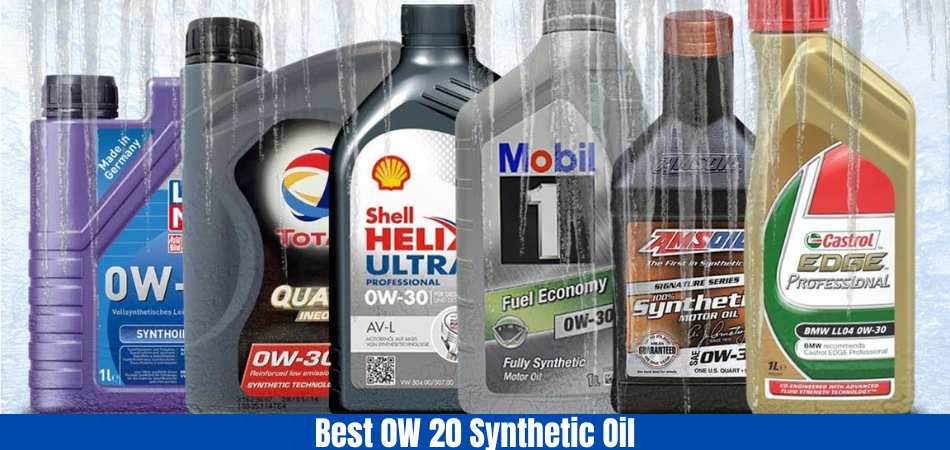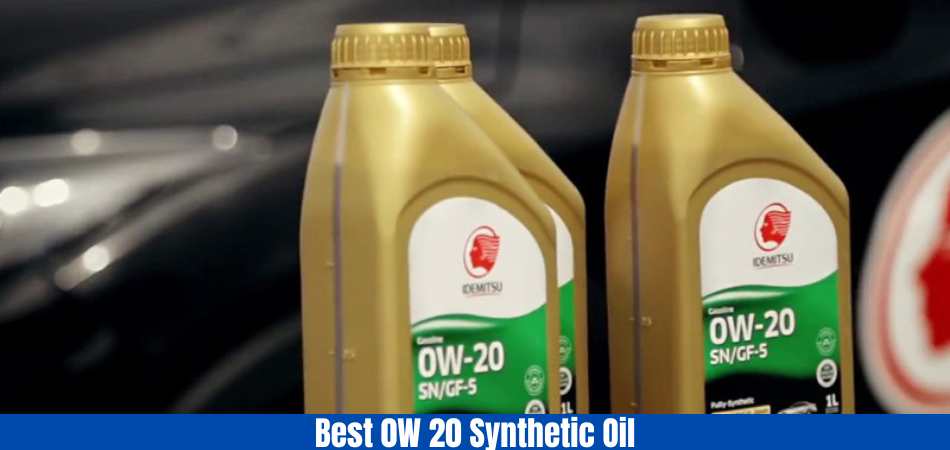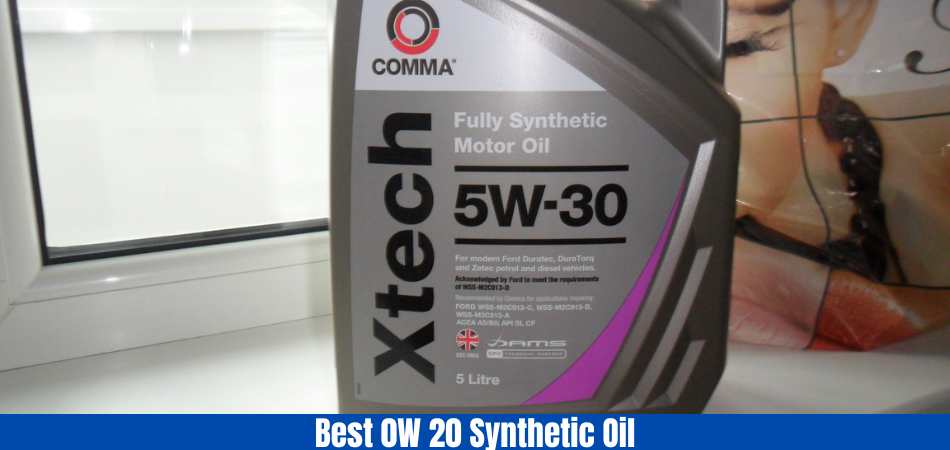
It goes without saying that having the right oil in your automobile can help keep it from having any problems. The type of oil you choose for your engine is much more crucial. So What is the best 0W 20 synthetic oil?
It goes without saying that having the right oil in your automobile can help keep it from having any problems. The type of oil you choose for your engine is much more crucial.
A quality 0W-20 synthetic oil is among the items that will aid in keeping your engine in good condition.
The enhanced protection against heat and oxidation that the 0W-20 synthetic oil may offer is one of its most desirable qualities. It helps prevent sludge build-up in your engine, which can reduce power and fuel efficiency. It is suitable for turbocharged, gasoline, and diesel engines. Additionally, it has better wear resistance than standard 5W-20 oils.
So, what is the best 0W-20 synthetic oil? There is much discussion on which oil is the “best 0W-20 synthetic oil.”
We’ll go over the top with 5 0W-20 synthetic oils in this article. To learn more, continue reading!
What is Synthetic Oil
That is an excellent question. Despite not fully understanding what synthetic oil is, you may be looking for it here. Let’s take a closer look at it.
The purpose of this oil is to mimic the type of oil that can be obtained from plants and animals.
Furthermore, this oil prevents your engine from overheating excessively, which makes it an excellent choice for your engine. Unlike petrol-based oils, the lubricant inside doesn’t evaporate as quickly as it does in a lubricant based on petroleum.
Are 0W-20 Synthetic Oils?
The answer is yes. There are two types of 0W-20 oils: fully synthetic and synthetic blends.
The formulation of these compounds allows them to function in a wide range of temperatures.
In order to achieve the desired formula, they molecularly break down mineral oil and restructure it.
There are typically two labels associated with fully synthetic oils: “Premium” and “Advanced.” Interestingly, these labels do not imply a particular grade of oil, but instead aim to promote the brand’s quality.
Why Should I Use 0W 20 Synthetic Oil?
It is without a doubt a game-changer for your vehicle and will certainly improve the engine’s performance. In most cases, there is an apparent smooth flow of oil – 0W20 oil is a perfect choice!
In addition, it extends the lifespan of your vehicle, which is good news if you do not wish to dispose of your car anytime soon. Furthermore, you will find that your fuel efficiency will be improved, so you will not have to make frequent trips to the gas station.
1. Good for Cold Starts
Because this oil has a thinner composition, it is also quite good at starting a vehicle cold, which is not true for a great deal of vehicle oils. In this instance, 0W20 synthetic oil is definitely the best choice if you live in an area with temperatures below freezing.
2. Increases Performance
In the event that your engine is compatible with this oil, you will certainly feel the difference. You will not only feel it, but your vehicle’s parts will also feel it since it will improve the performance of the engine parts as well as the overall performance of the vehicle.
Now let’s get down to business – what are the seven best synthetic oils for your engine at 0W20? Let’s get started!
Are All 0W-20 Oils The Same?

One of the most frequently asked questions among buyers is, “Are all 0W-20 oils the same?”? It is possible that the final answer will surprise the public. Research should be conducted by consumers and more information should be obtained about the products.
As a result, they will be able to shop around until they find the best deals. The consumer market could be changed in real-time as a result of this growing trend. It is a good idea to plan ahead when shopping for a particular product. Many people would benefit from more information.
Researching the new reviews should be the next step. There are already many reviews of many products available on the internet. This type of review builds up and sheds light on the subject at hand. There is a rapid increase in the number of people writing new reviews. There is already considerable interest in those projects among the general public. That is encouraging and could lead to a change in the market in the near future.
How Do You Know If Your Car Needs Synthetic Oil?
A mechanic holds synthetic oil for the purpose of maintaining a vehicle.
You will find out what kind of oil is best for your vehicle in your owner’s manual. If you wish to maintain the engine and gearing warranty, this is an important consideration.
Whether or not you should use synthetic automotive oil will depend on the condition of your engine. A poorly maintained engine or an engine that has been overheated may require the use of synthetic oils since synthetic oils resist degradation under these conditions and are better able to resist wear under extreme conditions.
According to the Environmental Protection Agency, half of the cars on US roads use synthetic oil. It is also advisable to check with your local manufacturer to determine whether your vehicle will be able to handle synthetic oil.
Long trips may also be possible with synthetic oil instead of conventional oil if you are going out of town.
According to the API, approximately 85% of new vehicles today can run on fully synthetic motor oils. There is no guarantee that all cars can use synthetic oils, however, if the engine was manufactured before June 2007, you may be able to install synthetic oil from any of the major oil companies.
What Is The Best 0W 20 Synthetic Oil?
There are many types of synthetic oil available. But What is the best 0W 20 synthetic oil? Let’s find out:
1. Mobil 1 Advanced Performance Fuel Economy Full Synthetic 0W-20 Motor Oil
Mobil 1 Advanced Performance Fuel Economy Full synthetic 0W-20 motor oil is a high-quality synthetic motor oil. It provides enhanced engine protection and improves fuel efficiency.
This motor oil is formulated with advanced synthetic base stocks that provide superior performance than conventional motor oils. These base stocks are refined and pure and can withstand high temperatures and heavy loads.
The proprietary blend of performance-enhancing additives in Mobil 1 Full synthetic 0W-20 motor oil helps to provide enhanced engine protection against wear, deposits, and sludge build-up. This helps to extend the life of the engine and maintain its performance over time.
The 0W-20 viscosity grade of this motor oil provides excellent low-temperature properties. It helps to improve cold weather starting and engine performance. This also helps to increase fuel efficiency by reducing friction within the engine.
This can result in lower fuel consumption and, therefore, lower operating costs for vehicle owners.
Pros:
- Improved fuel economy
- Enhanced engine protection and performance
- Excellent low-temperature properties for improved cold weather starting
- Meets the requirements of most auto-makers for use in gasoline engines
Cons:
- Higher cost compared to conventional motor oils
- Not 100% authentic
2. Castrol 03124 Edge 0W-20 Advanced Performance Full Synthetic Motor Oil

The Castrol Edge 0W-20 motor oil gives your engine outstanding performance and protection. Its sophisticated recipe, which integrates Fluid Titanium technology, offers unmatched performance under pressure. It strengthens the oil’s layer so that friction can decrease and you can prevent wear.
The oil’s ability to reduce metal-to-metal contact, even in extreme conditions and at various speeds, sets it apart from the rest.
With Castrol Edge 0W-20, you’ll enjoy a smoother, faster, and quieter ride with improved engine sound, even at high RPMs.
The oil also stands out in industry tests, ranking second in total base number (TBN). It measures its ability to neutralize acid and tops the charts in TEOST, a test of durability under operating conditions.
Pros:
- Advanced technology for improved engine protection and fuel efficiency
- Low viscosity for improved cold weather starting and fuel efficiency
- Meets requirements of many automakers for wide compatibility
- Improved fuel efficiency through reduced friction
- Trusted brand with a history of producing high-quality motor oils
Cons:
- May be more expensive than some conventional motor oils
- Can only be used in vehicles that recommend 0W-20 viscosity motor oil.
3. Valvoline Advanced Performance Full Synthetic SAE 0W-20 Oil
Valvoline Advanced Full Synthetic SAE 0W-20 has a low viscosity. & makes it easy to pump through engine parts, reducing engine workload, and improving fuel efficiency.
It’s a high-performance engine oil designed for use in modern cars. It comes from premium synthetic base oils; Valvoline Advanced Full Synthetic provides improved performance and protection than conventional motor oils.
The 0W-20 viscosity rating ensures fast oil flow at low temperatures, helping to reduce engine wear during cold starts.
The oil’s advanced formulation provides superior protection against engine wear. It helps to extend the life of your engine.
Valvoline Advanced Full Synthetic is suitable for use in a wide range of vehicles, including those with turbochargers and direct fuel injection systems. It maintains its viscosity even when hot, ensuring proper lubrication and protection for the engine’s metal surfaces.
It has a standard oil colour, making it easy to detect when it needs changing. This budget-friendly oil can also boost your vehicle’s mileage.
Pros:
- Improved performance compared to conventional motor oils
- Excellent low-temperature performance, reducing engine wear during cold starts
- Increased fuel efficiency and reduced emissions
- Superior wear protection, extending engine life
- Wide compatibility with a range of vehicles.
Cons:
- Higher cost compared to conventional motor oils
- May not be suitable for all vehicles.
4. Pennzoil Platinum Performance Full Synthetic 0W-20 Motor Oil
The top-performing oil, Pennzoil Platinum Full Synthetic 0W-20 Motor Oil, is now available. It keeps your car operating smoothly. Unlike other oils made from crude oil, this oil is crafted using a patented process that turns natural gas into pure and refined base oil.
With the goal of producing the purest base oil possible, Pennzoil utilizes its unique methods to create the base stock for this 0W-20 synthetic oil. This results in a base oil that is 99.99% pure and free from impurities.
To enhance the performance of this high-quality base oil, Pennzoil adds an advanced additive formula. The anti-wear additives provide excellent protection against engine wear, improved fuel economy, and exceptional engine cleanliness. This low-viscosity oil also excels in extreme temperature protection.
During cold starts, the engine is at its most vulnerable to wear as oil is slow to circulate to critical components. However, Pennzoil Platinum Full Synthetic 0W-20 Motor Oil offers faster flow at low temperatures, reducing friction and wear. & it is a reliable choice for your vehicle.
Pros:
- Improved engine protection
- Better fuel economy
- Cold temperature protection
- Engine cleanliness and quietness
Cons:
- Cost may be higher compared to conventional motor oils.
5. Royal Purple API-Licensed SAE 0W-20 High-Performance Synthetic Motor Oil
Royal Purple’s SAE 0W-20 High-Performance SN Synthetic Motor Oil provides reliable protection for your vehicle’s engine. Performance and efficiency are its hallmarks. Especially compared to other 0W-20 viscosity oils.
This oil helps protect against deposits and sludge while keeping vital engine parts lubricated. It has a low viscosity that makes it easy to flow even in cold temperatures, ensuring quick and effective lubrication. The oil also helps to improve fuel economy and boost engine performance.
When you switch to Royal Purple, you’ll notice the difference. Your engine will run smoother and quieter, and you’ll experience improved acceleration. All of these benefits contribute to the reputation of Royal Purple as a top-notch motor oil for performance, protection, and cleanliness.
Pros:
- Engine protection and cleanliness
- Improved fuel efficiency
- Efficient low-temperature performance
- Improved engine performance and smoothness
Cons:
- Higher cost compared to conventional motor oils.
What are the Benefits Of Using 0W-20 Synthetic Motor Oil?
1. Improve Fuel Economy
0W-20 improves the fuel economy of the engine. It is a lower viscosity oil than other popular weight oils such as 5W-30 and 0W-30. Oil with a lower viscosity is less viscous and thinner than oil with a higher viscosity.
The thinner the oil, the more readily and efficiently it can flow through all the critical engine components, resulting in a reduction in drag and resistance to the moving parts.
As a result, thinner oil consumes less fuel, as the engine spends less energy pumping the oil. As a result, the engine consumes less fuel with a lower viscosity oil.
A higher consumption of fuel leads to a greater amount of gasoline and diesel being burned, resulting in an increase in CO2 emissions. Global warming is primarily caused by carbon dioxide.
Approximately 80 percent of all U.S. greenhouse gas emissions are attributed to CO2, according to the United States Environmental Protection Agency.
A growing number of lower viscosity oils are being introduced in response to the increasing demand for reducing carbon emissions.
2. Long Lasting
Depending on the manufacturer, 0w-20 synthetic oil lasts approximately 6 months to 1 year or 7,500 to 10,000 miles between oil changes.
They do not become thick when exposed to extreme heat due to their refined properties and uniform molecules. This is the reason why they last longer.
As a matter of fact, it lasts two or three times longer than any regular oil. There is, however, an additional cost associated with 0w-20 synthetic oil.
3. Protects Engine
Furthermore, 0w-20 synthetic oil provides proper lubrication for the engine as well as protection against friction and wear and tear on the critical components.
Oil plays a significant role in reducing friction and reducing wear on engines. An oil with a synthetic content of 0w-20 is formulated with anti-wear additives and friction modifiers in order to protect against wear and tear.
Coating the moving parts with 0w-20 synthetic oil, keeps them slippery and greasy, forming a strong barrier between them.
In engines, when two metal parts contact each other, they slip over each other, reducing friction, which causes excessive heat and wear.
Additionally, the antioxidants included in the 0w-20 engine oil control and resist oxidation, preventing the oil from degrading and breaking down. An oil with a viscosity rating of 0w-20 is capable of protecting an engine from possible damage in general.
4. Great for winter
As a low-temperature grade oil, 0w-20 is highly effective in extremely cold conditions.
It is common for oil to become thick during the winter and when it has been idling for a long period of time. As soon as the engine is started, the oil remains thick and viscous, making it more difficult for it to circulate.
In this situation, the engine is unable to lubricate its critical parts rapidly and easily, increasing metal-to-metal contact and friction. Some experts believe that improper lubrication during cold starting contributes to 80% of engine wear.
As an aside, 0w-20 oil has a lower viscosity, which allows it to flow quickly and easily to lubricate critical engine parts, thus reducing friction and wear.
How To Choose The Best 0w-20 Synthetic Oil?
Choosing the best 0W-20 synthetic oil depends on a variety of factors, such as the vehicle’s make, model, and year, as well as driving conditions and personal preferences. Here are some steps to consider when choosing the best 0W-20 synthetic oil:
- Check the vehicle owner’s manual – The manual will specify the recommended viscosity and performance level for the engine.
- Consider driving conditions – Different oils have different additives that cater to different driving conditions such as high mileage, severe weather conditions, or towing.
- Look for API and OEM approvals – The American Petroleum Institute (API) and original equipment manufacturers (OEMs) have approved certain oils as meeting their standards for performance and protection.
- Read reviews and compare brands – Reading reviews from other vehicle owners and experts can give an idea of the oil’s performance. Comparing different brands and their features, such as cost, additives, and formulation can help make an informed decision.
- Consider personal preferences – Some drivers prefer oils that offer more fuel economy, while others prioritize engine protection. It’s important to choose an oil that meets individual needs and preferences.
It’s also important to check the oil level and change it according to the manufacturer’s recommendation.
Is 0W-20 Oil the Best Choice for My Car?

There are several factors that influence the answer.
One of the reasons why 0W-20 is so popular is the viscosity grade it can provide regardless of the temperature. We have already discussed a number of benefits that should also be considered.
However, it is still not recommended for all types of vehicles.
It is necessary to develop formulas that will operate in extreme temperatures, for example, in two-wheelers and aviation vehicles.
It is true that the primary objective of the 0W-20 is to provide a formula that is balanced and can be used in either direction, however, it cannot be denied that it works better in the cold than it does in the heat.
The first step in choosing the correct formula is to determine the viscosity grade appropriate for your vehicle.
In order to do this, you should refer to the owner’s manual for your vehicle.
However, we provide you with a quick rundown of the best 0W-20 oils available on the market today so that you can make a more informed purchasing decision.
How Many Miles Does 0W-20 Full Synthetic Oil Last?
Approximately 10,000 miles can be covered by fully synthetic motor oil according to Mobil. Full synthetic motor oils last longer than conventional oils due to their formulation that protects against wear and contamination that might otherwise degrade lubrication or prematurely wear an engine.
Therefore, you can run your engine out at least twice as much with a fully synthetic blend oil before having to change it. Modern engines require oils that meet or exceed their performance and durability requirements.
Most full synthetics have a life expectancy of about 10,000 miles, while synthetic brands that use only synthetics above parabens and have their own additives generally have a life expectancy of approximately 8,000 miles. Oils synthesized from synthetic materials should have a longer shelf life than conventional oils.
Final Thought
So you might get the answer to the question: What is the best 0W 20 synthetic oil? In conclusion, choosing the best 0W-20 synthetic motor oil depends on a variety of factors, including engine type, driving conditions, and personal preferences.
Choosing the best 0W-20 synthetic motor oil for your vehicle can improve engine performance and longevity. They are refined and formulated with high-quality base oils and advanced additives, providing enhanced protection against wear and tear, improved fuel efficiency, and better engine cleanliness.
Using the best 0W-20 synthetic oil can provide peace of mind and improve the health of your engine.
Keep Reading What Is The Best 0W 20 Synthetic Oil
FAQs
How durable is 0w20 synthetic oil?
To guarantee the best performance, standard oil change intervals are set at 5,000 miles or 6 months. Toyota cars that require 0W-20 synthetic oil have an extended warranty period of 10,000 miles or 12 months.
How quickly does 0W20 burn?
Many modern engines use oil that is thinner and lower in viscosity, such as 5W20 or 0W20, rather than something like 10W30. These oils’ thinner consistency makes it simpler for them to pass through gaskets, seals, and rings that have even somewhat worn over time, which increases oil consumption.
Does synthetic 5W-20 oil work well?
Your vehicle may benefit from 5W-20 engine oil. It increases your fuel economy and assists with fuel efficiency and engine safety in colder areas. It provides a respectable working temperature range. The most crucial thing to keep in mind is to do basic maintenance and have an oil change.
Which is better, 5W20 or 5W30?
For drivers in hotter climates, 5w 30 oil is appropriate. Compared to 5w 20 oil, it has a wider temperature range and a greater viscosity index. In both cold and hot climates, 5w 30 oil is recommended. 5 w/20 is appropriate for cold climates.
Can I swap out 5W40 for 5W20?
The short answer is no, you shouldn’t use 5W20 when the manufacturer recommends 5W40. The internal engine may not be properly lubricated by the thinner oil. To survive the heat of the turbo, the turbo also requires synthetic oils.







Leave a Reply